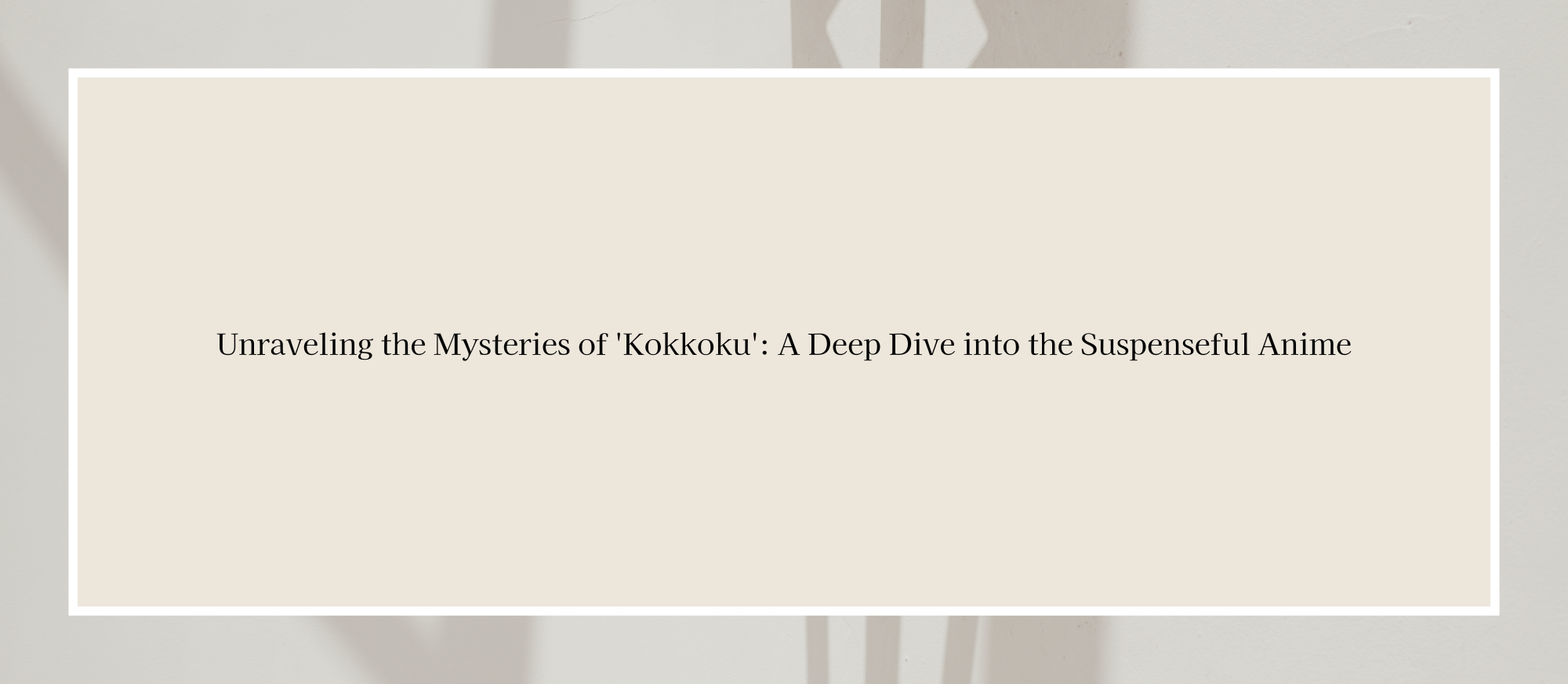Plot Overview and Key Themes in 'Kokkoku'

Alex: Chris, can you give me a detailed synopsis of the main plot of "Kokkoku"?
Chris: Sure, Alex. "Kokkoku" follows the story of the Yukawa family, who possess a mysterious stone that allows them to stop time and enter a dimension called 'Stasis.' The series begins with a crisis when Juri Yukawa’s nephew and brother are kidnapped by a cult known as the Genuine Love Society. In a desperate bid to save them, Juri’s grandfather uses the stone to freeze time, allowing the family to move through this static world.
Alex: That sounds intense. What happens next?
Chris: In the frozen world of 'Stasis,' the Yukawa family encounters various dangers, including the cult members who can also move in this frozen time. They must navigate this perilous environment while trying to rescue their family members. Along the way, they uncover secrets about their own abilities, the true nature of 'Stasis,' and the sinister motives of the Genuine Love Society.
Alex: What are some of the key themes explored in "Kokkoku"?
Chris: "Kokkoku" delves into several key themes, including time manipulation, family bonds, and survival. Time manipulation is at the heart of the series, as the ability to stop time introduces both opportunities and moral dilemmas for the characters. The theme of family bonds is also central, as the story revolves around the Yukawa family’s efforts to protect and support each other in the face of extraordinary circumstances. Survival is another crucial theme, highlighted by the constant threats they face in the world of 'Stasis' and the need to adapt quickly to survive.
Alex: How are these themes woven into the storyline?
Chris: The themes are intricately woven into the storyline through the characters' experiences and interactions. Time manipulation is explored not just as a supernatural ability but as a tool that raises ethical questions about its use. For example, the family must decide when to use their power and when to refrain, considering the consequences of altering time.
Alex: Can you elaborate on the theme of family bonds?
Chris: Family bonds are portrayed through the close-knit Yukawa family, whose relationships are tested and strengthened throughout the series. Juri’s determination to save her nephew and brother demonstrates her deep sense of responsibility and love for her family. Her grandfather’s wisdom and sacrifices highlight the generational ties that bind them together. The series emphasizes the importance of family support in overcoming challenges and facing moral dilemmas.
Alex: How does the theme of survival play out in the series?
Chris: Survival is a constant struggle for the Yukawa family in 'Stasis.' They face threats from the cult members, mysterious creatures called Handlers, and the dangers of the frozen world itself. Their survival depends on their ability to work together, think strategically, and adapt to new information. The series illustrates that survival is not just about physical endurance but also about mental resilience and emotional strength.
Alex: It sounds like "Kokkoku" offers a rich and layered narrative.
Chris: Absolutely, Alex. The combination of supernatural elements with deep, relatable themes makes "Kokkoku" a compelling watch. The characters’ struggles with time manipulation, their strong family bonds, and their fight for survival create a narrative that is both thrilling and thought-provoking. It’s a series that challenges viewers to consider the ethical implications of power and the enduring strength of familial love.
Alex: Thanks for the insightful analysis, Chris. "Kokkoku" seems like a fascinating series with a lot to offer.
Chris: It certainly is, Alex. Whether you’re drawn to its suspenseful plot, complex characters, or the exploration of profound themes, "Kokkoku" is a series that captivates and engages on multiple levels.
This dialogue-based article provides a detailed synopsis of the main plot of "Kokkoku," discusses key themes such as time manipulation, family bonds, and survival, and analyzes how these themes are woven into the storyline, creating a rich and engaging narrative.
Character Analysis and Development in 'Kokkoku'

Alex: Chris, let’s dive into the characters of "Kokkoku." Can you start with Juri Yukawa and her family members?
Chris: Sure, Alex. Juri Yukawa is the protagonist of the series. She’s a determined and resourceful young woman who becomes the central figure in the family's struggle to rescue their kidnapped members. Juri's resilience and quick thinking are crucial in navigating the dangers of 'Stasis.' Her motivations are deeply rooted in her love for her family and her desire to protect them at all costs.
Alex: How about the other members of the Yukawa family?
Chris: Juri's grandfather, Jusetsu Yukawa, is another key character. He possesses the family's secret knowledge about the stone that stops time. His wisdom and experience are invaluable, and he often provides strategic guidance. Juri's father, Takafumi Yukawa, is a bit of a wildcard. Although he initially appears less capable, his scientific curiosity and determination add depth to his character. Juri's brother, Tsubasa, and her young nephew, Makoto, are the ones initially kidnapped, and their rescue becomes the driving force of the plot.
Alex: Can you explore their backgrounds and motivations in more detail?
Chris: Juri's background reveals a history of personal struggles and the weight of family expectations. Her strong sense of responsibility is a reaction to these pressures. Jusetsu, the grandfather, has a mysterious past connected to the stone and the secrets of 'Stasis.' His motivations are driven by a need to protect his family and rectify past mistakes. Takafumi’s character arc shows significant growth; initially seen as unreliable, he proves his worth through his inventive approaches and his growing bond with his family.
Alex: How do these characters grow throughout the series?
Chris: Throughout the series, each character undergoes significant development. Juri transforms from a dutiful daughter into a decisive leader, learning to harness her abilities and confront her fears. Jusetsu's past actions are revealed, providing insight into his protective nature and deepening his relationship with Juri. Takafumi evolves from a seemingly selfish individual into someone who understands the value of family unity and loyalty.
Alex: What about the antagonists, the Genuine Love Society?
Chris: The Genuine Love Society is a cult with its own agenda involving 'Stasis.' Led by the enigmatic and manipulative Sagawa, the cult seeks to exploit the power of the stone for their gain. Sagawa is a complex antagonist whose motivations are rooted in his desire to transcend human limitations. His interactions with the Yukawa family are filled with tension and psychological conflict, adding layers to the narrative.
Alex: How does the Genuine Love Society impact the plot?
Chris: The Genuine Love Society’s actions drive much of the conflict in "Kokkoku." Their kidnapping of Tsubasa and Makoto sets the entire story in motion. As the Yukawa family navigates 'Stasis,' they must constantly outmaneuver the cult members, who are equally adept at moving within the frozen world. The cult’s presence introduces themes of power, control, and the moral dilemmas associated with time manipulation.
Alex: Can you analyze the interplay between the Yukawa family and the cult?
Chris: The interplay between the Yukawa family and the Genuine Love Society is central to the series. The Yukawa family represents resilience, unity, and the ethical use of power, while the cult embodies manipulation, ambition, and moral ambiguity. Their confrontations highlight the contrasting motivations and philosophies, creating a rich narrative tension. The family's growth is often catalyzed by these conflicts, forcing them to adapt and strengthen their bonds.
Alex: It sounds like the characters and their development are a significant part of what makes "Kokkoku" engaging.
Chris: Absolutely, Alex. The detailed character development and the complex dynamics between the Yukawa family and the Genuine Love Society add depth and intrigue to "Kokkoku." Each character's journey and the evolving relationships keep the audience invested in the storyline and its outcome.
This dialogue-based article provides detailed descriptions of the main characters in "Kokkoku," explores their backgrounds, motivations, and growth throughout the series, and analyzes the antagonist group, the Genuine Love Society, and their impact on the plot.
Visual and Artistic Style of 'Kokkoku'

Alex: Chris, let’s discuss the visual and artistic style of "Kokkoku." How would you describe its unique visual style and animation quality?
Chris: "Kokkoku" has a distinct visual style that sets it apart from many other anime series. The animation quality is high, with detailed character designs and backgrounds that create an immersive experience. The use of muted color palettes and realistic shading gives the series a grounded, almost gritty feel that complements its suspenseful and supernatural themes.
Alex: How do the visuals enhance the storytelling and atmosphere?
Chris: The visuals in "Kokkoku" play a crucial role in enhancing the storytelling and atmosphere. The depiction of 'Stasis,' the frozen world where time stands still, is particularly striking. The use of desaturated colors and stillness within this dimension creates a stark contrast to the dynamic movements of the characters, emphasizing the eerie and unsettling nature of the setting. This visual approach not only heightens the tension but also underscores the supernatural elements of the story.
Alex: That sounds effective. Are there specific visual techniques that stand out?
Chris: Yes, several techniques stand out. The animation often uses close-up shots and detailed facial expressions to convey the characters' emotions and internal struggles, adding depth to their portrayals. Additionally, the contrast between the static environment of 'Stasis' and the fluid movements of the characters is enhanced through meticulous frame transitions and special effects, like the shimmering barrier that marks the boundary of the frozen world.
Alex: How does "Kokkoku" compare with other anime in the same genre?
Chris: Compared to other anime in the supernatural and thriller genres, "Kokkoku" stands out for its realistic art style and atmospheric depth. Many supernatural anime opt for more vibrant and exaggerated visual styles, but "Kokkoku" chooses a more subdued and realistic approach, which adds to its unique identity. This style enhances the suspense and gravity of the story, making the supernatural elements feel more plausible and grounded.
Alex: Can you give examples of other anime and how they differ visually?
Chris: Sure. Take "Death Note," for instance. It also deals with supernatural themes and has a dark atmosphere, but its visual style is more stylized with dramatic lighting and sharp contrasts. "Steins;Gate," another series involving time manipulation, uses a brighter color palette and softer character designs, which contrasts sharply with "Kokkoku’s" more somber and realistic visuals. These differences highlight how "Kokkoku’s" unique visual style contributes to its distinct narrative tone.
Alex: How do these differences affect the viewing experience?
Chris: The realistic and muted visual style of "Kokkoku" makes the supernatural elements and the story's suspense more palpable. It creates a sense of immersion that is often missing in more stylized anime. Viewers feel the weight of the characters' experiences and the tension of their situations more acutely. This approach aligns well with the series' themes of survival, ethical dilemmas, and the passage of time, making the viewing experience both intense and engaging.
Alex: It sounds like the visuals are a significant part of what makes "Kokkoku" compelling.
Chris: Absolutely, Alex. The visual and artistic style of "Kokkoku" not only enhances the storytelling but also helps to create a unique atmosphere that sets it apart from other anime in its genre. The careful attention to detail, the realistic portrayal of characters and settings, and the effective use of color and shading all contribute to a rich and immersive viewing experience.
Alex: Thanks for the detailed explanation, Chris. It's clear that the visuals play a crucial role in making "Kokkoku" a standout series.
Chris: You're welcome, Alex. The visual and artistic elements are indeed central to the impact and appeal of "Kokkoku," making it a memorable and distinctive anime.
This dialogue-based article provides an examination of the unique visual style and animation quality of "Kokkoku," discusses how the visuals enhance the storytelling and atmosphere, and compares it with other anime in the same genre, highlighting what sets it apart.
Reception and Impact of 'Kokkoku'

Alex: Chris, how has "Kokkoku" been received by audiences and critics?
Chris: "Kokkoku" has garnered a mixed to positive reception from both audiences and critics. Many praise the series for its unique premise, suspenseful plot, and well-developed characters. The innovative concept of time manipulation and the emotional depth of the family dynamics have been highlighted as strengths. However, some critics have pointed out that the pacing can be uneven at times, and a few plot elements may feel underdeveloped. Overall, the series has been appreciated for its originality and compelling narrative.
Alex: What about its cultural impact and popularity?
Chris: "Kokkoku" has made a notable impact within the anime community, particularly among fans of supernatural and psychological thrillers. Its distinctive approach to the themes of time manipulation and survival, combined with a strong focus on family bonds, has resonated with many viewers. The series has sparked discussions about its philosophical and ethical implications, further enhancing its cultural footprint. Although it may not have reached mainstream popularity, it has certainly carved out a niche audience that appreciates its depth and complexity.
Alex: How has the series contributed to the genre?
Chris: "Kokkoku" has contributed to the supernatural and thriller genres by introducing fresh ideas and a unique storytelling approach. Its exploration of time manipulation as a central plot device, combined with a realistic visual style, sets it apart from other series in the genre. This innovation has encouraged other creators to experiment with similar concepts, potentially leading to a broader acceptance and exploration of these themes in future works.
Alex: What are the prospects for future seasons or spin-offs?
Chris: Given the series' positive reception and the rich narrative potential, there is certainly speculation about future seasons or spin-offs. The current storyline leaves room for further exploration, particularly in uncovering more about the origins of the 'Stasis' world and the stone that enables time manipulation. Additionally, spin-offs could delve deeper into the backgrounds of individual characters or explore new families with similar abilities.
Alex: Can you speculate on what future content might look like?
Chris: Future content could expand the world-building aspects of "Kokkoku." A potential second season might explore the historical origins of the time-stopping stone, introducing new characters and settings. Spin-offs could focus on different timelines or parallel dimensions, providing fresh perspectives and challenges for the characters. The series could also delve into the consequences of time manipulation on a larger scale, addressing broader ethical questions and societal impacts.
Alex: It sounds like there's a lot of potential for the series to grow.
Chris: Absolutely, Alex. The intriguing premise and well-developed characters provide a solid foundation for further storytelling. Whether through additional seasons or spin-offs, "Kokkoku" has the potential to continue captivating audiences with its unique blend of suspense, supernatural elements, and deep emotional narratives.
Alex: Thanks for the insight, Chris. It’s exciting to think about the possibilities for "Kokkoku."
Chris: You're welcome, Alex. The series has definitely left a mark, and I’m sure fans are eager to see what the future holds for "Kokkoku."
This dialogue-based article provides a summary of the reception of "Kokkoku" by audiences and critics, discusses its cultural impact and popularity, and speculates on the potential for future seasons or spin-offs based on the current storyline.









